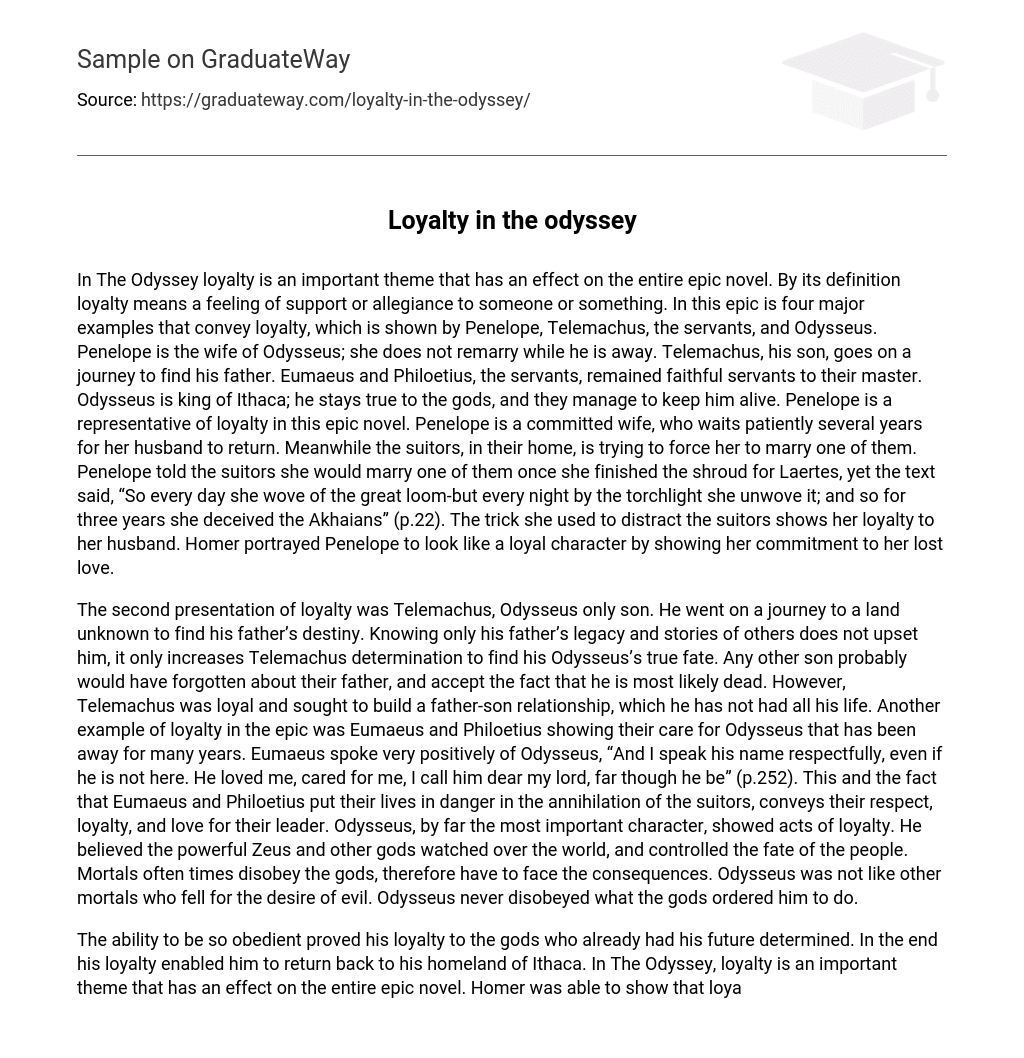In The Odyssey loyalty is an important theme that has an effect on the entire epic novel. By its definition loyalty means a feeling of support or allegiance to someone or something. In this epic is four major examples that convey loyalty, which is shown by Penelope, Telemachus, the servants, and Odysseus. Penelope is the wife of Odysseus; she does not remarry while he is away. Telemachus, his son, goes on a journey to find his father. Eumaeus and Philoetius, the servants, remained faithful servants to their master. Odysseus is king of Ithaca; he stays true to the gods, and they manage to keep him alive. Penelope is a representative of loyalty in this epic novel. Penelope is a committed wife, who waits patiently several years for her husband to return. Meanwhile the suitors, in their home, is trying to force her to marry one of them. Penelope told the suitors she would marry one of them once she finished the shroud for Laertes, yet the text said, “So every day she wove of the great loom-but every night by the torchlight she unwove it; and so for three years she deceived the Akhaians” (p.22). The trick she used to distract the suitors shows her loyalty to her husband. Homer portrayed Penelope to look like a loyal character by showing her commitment to her lost love.
The second presentation of loyalty was Telemachus, Odysseus only son. He went on a journey to a land unknown to find his father’s destiny. Knowing only his father’s legacy and stories of others does not upset him, it only increases Telemachus determination to find his Odysseus’s true fate. Any other son probably would have forgotten about their father, and accept the fact that he is most likely dead. However, Telemachus was loyal and sought to build a father-son relationship, which he has not had all his life. Another example of loyalty in the epic was Eumaeus and Philoetius showing their care for Odysseus that has been away for many years. Eumaeus spoke very positively of Odysseus, “And I speak his name respectfully, even if he is not here. He loved me, cared for me, I call him dear my lord, far though he be” (p.252). This and the fact that Eumaeus and Philoetius put their lives in danger in the annihilation of the suitors, conveys their respect, loyalty, and love for their leader. Odysseus, by far the most important character, showed acts of loyalty. He believed the powerful Zeus and other gods watched over the world, and controlled the fate of the people. Mortals often times disobey the gods, therefore have to face the consequences. Odysseus was not like other mortals who fell for the desire of evil. Odysseus never disobeyed what the gods ordered him to do.
The ability to be so obedient proved his loyalty to the gods who already had his future determined. In the end his loyalty enabled him to return back to his homeland of Ithaca. In The Odyssey, loyalty is an important theme that has an effect on the entire epic novel. Homer was able to show that loyalty by presenting it with many different characters. Penelope’s loyalty was established through true love. Telemachus showed his loyalty by going on a search for his father he hardly knew to establish a relationship. Eumaeus and Philoetius was just very loyal and true servants. Odysseus showed a strong sense of respect to the gods, and they helped him overcome difficult obstacles. Each character proved their faithfulness differently, but they all showed a great extent of loyalty. By the following characters remaining loyal in life, Odysseus was able to return home back to his family.





